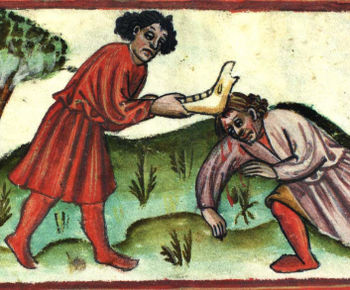Genesis Encyclopedia:
C
Cain
 The oldest son of Adam and Eve. He
was born after they were banished from the Garden of Eden. He was a "tiller
of the soil". (4:1-2)
The oldest son of Adam and Eve. He
was born after they were banished from the Garden of Eden. He was a "tiller
of the soil". (4:1-2)
Cain and his younger
brother Abel brought offerings to God. Cain brought fruits, and Abel (who was a
shepherd) brought the firstlings of his flock. (4:3-4) Without giving any
reason, God accepted Abel's offering, but rejected Cain's. Angered at this
rejection, Cain killed Abel (right). (4:8)
To punish Cain,
God said two things. One was that the ground would no longer yield to him its
wealth. The other was that Cain was condemned to be a fugitive and a vagabond on
the earth for the rest of his life. (4:12) God put a mark on Cain, but it was a
mark of protection, not of punishment. (4:15)
Cain
was exiled. He settled in the land of Nod, located east of Eden. (4:16) He
married a woman who bore him a son named Enoch. Cain later built a city, and
called it Enoch. (4:17)
Cainan (also called Kenan)
Son of
Enos (also called Enosh). He lived
to be 910. He fathered various sons and daughters, including Mahalaleel (at age 840). (5:9-14)
Calah
A city built by Nimrod. (10:10-11)
Calneh
A city in Nimrod's
kingdom. It was located in the land of Shinar.
(The land
of Shinar was located north of the Persian Gulf, between the Tigris and
Euphrates rivers, in what would today be Iraq, or northeastern Syria. It was
later called Chaldea, and later Babylon.) (10:9-10)
Canaan - There are two:
1. A
son of Ham. (9:18,22; 10:6) After Noah awoke from his drunken sleep, Noah
cursed Canaan. (9:24-27) Canaan later had two sons: Sidon and Heth. (10:15) He
was the forefather of a huge tribe of people known as the Canaanites, who lived
in the land of Canaan. (10:15-18)
2. A land region
on the eastern coast of the Mediterranean Sea. It was located between the Mediterranean Sea on its west
side, the Jordan river on its east side, Egypt on its south side, and the
kingdom of Babylon on its north side.
(By today's map, it would be located at the country of Israel.)
It was lived in by the Canaanites, descendants of Canaan (Ham's son).
Canaanites
A huge tribe of
people who were descendants of Canaan, the son of Ham. They lived in the land of
Canaan (see above). They had many subdivisions. The subdivisions included
Jebusites, Amorites, Girgasites, Hivites, Arkites, Sinites, Arvadites, Zemarites,
and Hamathites. (10:15-18) Also the Hittites were a subdivison.
Caphtorim
A child of Mizraim. (10:14)
Carmi
A son of Reuben. He was
one of Jacob's family that moved to Egypt. (46:5-9)
Casluhim
A child of Mizraim.
He was the parent of Philistim. (10:14)
Chaldea
Another name for the
kingdom of Shinar, or Babylon (a kingdom in the land of Mesopotamia). The
kingdom was called Shinar at first. Later it was renamed Chaldea, and later
Babylon.
(It was located in what would today be Iraq, or northeastern Syria.)
The city of Ur was in the kingdom. (11:28,31; 15:7)
Chaldeans (also called Chaldees)
The people of the kingdom of Chaldea. (11:28,31; 15:7)
Chaldees (also called Chaldeans)
The people of the kingdom of Chaldea. (11:28,31; 15:7)
Chedorlaomer
The king of the
city of Elam during the civil war in the land of Canaan. (14:2) He was the
leader of the winning side. But then Abram and his army defeated Chedorlaomer.
(chapter 14)
Cheran
A son of Dishon. (36:26)
Cherub
A type of angel. Some
cherubim were stationed by God as guards at the entrance of the Garden of Eden
after Adam and Eve's expulsion. They were assigned to prevent the couple from
reentering the garden. (3:24)
Chesed (also called Kesed)
A
son of Nahor (Abraham's brother) by his wife Milcah. (22:20-23)
Chezib
The place where Judah
was when his wife Shua bore their third son, Shelah. (38:5)
Cush - There are two:
1. A land that the Gihon river (one of the four rivers that flows out of Eden)
encircles. It is also called Ethiopia. (2:13)
2. A
son of Ham. He had six sons: Seba, Havilah, Sabtah, Raamah, Sabtechah, and
Nimrod. (10:6-8)
A
B
C
D
E
F
G
H
I
J
K
L
M
N
O
P
Q
R
S
T
U
V W X Y
Z
Back to Genesis Encyclopedia Home Page
Back to Genesis Home Page
 The oldest son of Adam and Eve. He
was born after they were banished from the Garden of Eden. He was a "tiller
of the soil". (4:1-2)
The oldest son of Adam and Eve. He
was born after they were banished from the Garden of Eden. He was a "tiller
of the soil". (4:1-2)